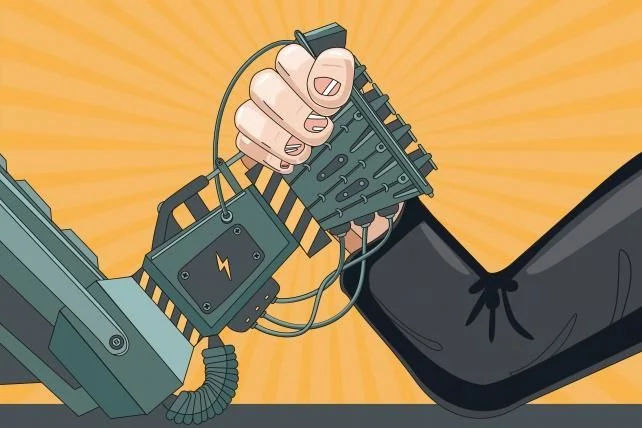Artificial Intelligence is the latest advance in Internet technology – and undoubtedly the most controversial and scariest. It is not the first technology to conjure up an existential threat to mankind. We lived through that anxiety in the early years of the atomic age. The boon to the industrial age, fossil fuel, is now seen by many as threatening a human apocalypse.
So … is AI any different? Is it just another technology that engenders initial panic – but will be generally accepted with its benefits and drawbacks? Or is this something else – a unique threat to humankind in the long run?
We know it threatens jobs. But so did industrialization, automation, and robotics – and we adjusted to all that without much disruption. We gained the benefits, and the Draconian downsides failed to gain footing.
However, AI IS different. All of the human progress – the good and the bad – was in the hands of … humans. We were in control. Humans developed the technologies, and humans mitigated the problems. We had something no machine, technology, or Internet had – a brain that “thinks.”
AI is the first technology that … thinks. This commentary is much too short to cover all the implications of an artificial technology that thinks. In fact, it can outthink – and outperform – we mere humans.
In an earlier challenge, I asked AI to write an editorial in support of sending fighter jets to Ukraine. It delivered an excellent product in about 10 seconds. In that case, AI was obeying my instructions. But what if AI had a mind of its own – had its own goals.
That is not a new thought. It has been a staple of science fiction. Back in 1920, Czech writer Karel Čapek produced a play called “Rossum’s Universal Robots,” in which robots ruled. They could “think” and were developing “emotions” – love. In the “2001 Space Odyssey,” an onboard computer named HAL (each letter preceding IBM) took over the space station by its own will.
I wondered if AI, itself, would tell me the dangers of … AI. So, I asked it to write an editorial explaining the dangers of AI. This is what I got.
“Artificial Intelligence (AI) has been a topic of discussion for many years and has been a subject of both excitement and concern. While AI has the potential to revolutionize our lives in many ways, it also poses several risks and dangers that we should be aware of.
Some of the dangers of AI include:
- Job losses due to AI automation
- Social manipulation through AI algorithms
- Social surveillance with AI technology
- Biases due to artificial intelligence
- Widening socioeconomic inequality as a result of AI
- Weakening ethics and goodwill because of AI
- Autonomous weapons powered by artificial intelligence
- Financial crises brought about by AI algorithms
These are just some of the dangers that have been identified by experts in the field. It is important to note that these risks are not just theoretical but have already been observed in some cases.”
In a sense, AI has ratted on itself. One could write a commentary on each of the dangers to which AI confessed – and there are others that it did not reveal.
Many very intelligent people – including Elon Musk – have indicated the potential of AI eliminating the need for humans. There is no function that we perform that evolved AI cannot theoretically do. There is no reason that mechanically based intelligence cannot replace biologically based intelligence.
If you think that is impossible, consider this. Virtually everything upon which we depend for survival is already mechanically based. It is all hackable. It can be controlled by an intelligent force – even if that intelligence is artificial. Perhaps we are wrong to think of it as “artificial” intelligence. Maybe it is real intelligence – as real as ours.
I do not believe that we will see an apocalypse in the near future, but AI is already disrupting our security – our ability to discern between traditional reality and virtual reality. Is AI the proverbial Pandora’s Box that releases forces that cannot be restrained?
So, there ‘tis.
